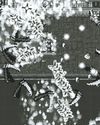
Sitting down with Andrew Shouldice, fresh off the back of a double BAFTA win, conversation immediately wanders away from the topic of how this award-winning game was made, and onto the question of notebooks. Shouldice leans over the table to admire ours, a little black Moleskine affair, and it’s only after a good few minutes on the relative benefits of stitched versus ringbound that we actually get back to the point at hand. An unexpected tangent, certainly – but one that, as it turns out, speaks to the important role such apparatus played in Tunic’s development.
This shouldn’t, perhaps, come as a surprise. After all, Tunic makes clear Shouldice’s fondness for good old-fashioned paper and ink through its in-game instruction manual. Loaded with beautifully illustrated maps, with hints written in a glyph cipher and biro annotations left by some unseen hand, it feels like a gentle suggestion that you might want to keep your own notetaking equipment to hand, in order to track the game’s many secrets, and perhaps even dabble in a little translation if you choose.
Catching up again with Shouldice, now back home in Halifax, Nova Scotia, he produces the notebook that contains the very first inklings of this game, and tells us it dates back to 2010 – five years before Tunic’s development began. Not that players would necessarily recognise its contents, he explains: “It’s got notes for games that did not end up becoming Tunic. Stuff like, ‘What if it was a pixel game where you’re just a little guy who’s, like, seven pixels tall?’”
This story is from the {{IssueName}} edition of {{MagazineName}}.
Start your 7-day Magzter GOLD free trial to access thousands of curated premium stories, and 9,000+ magazines and newspapers.
Already a subscriber ? Sign In
This story is from the {{IssueName}} edition of {{MagazineName}}.
Start your 7-day Magzter GOLD free trial to access thousands of curated premium stories, and 9,000+ magazines and newspapers.
Already a subscriber? Sign In

BONAPARTE: A MECHANIZED REVOLUTION
No sooner have we stepped into the boots of royal guard Bonaparte than we’re faced with a life-altering decision.

TOWERS OF AGHASBA
Watch Towers Of Aghasba in action and it feels vast. Given your activities range from deepwater dives to climbing up cliffs or lumbering beasts, and from nurturing plants or building settlements to pinging arrows at the undead, it’s hard to get a bead on the game’s limits.

THE STONE OF MADNESS
The makers of Blasphemous return to religion and insanity

Vampire Survivors
As Vampire Survivors expanded through early access and then its two first DLCs, it gained arenas, characters and weapons, but the formula remained unchanged.

Devil May Cry
The Resident Evil 4 that never was, and the Soulslike precursor we never saw coming

Dragon Age: The Veilguard
With Dragon Age: The Veilguard, BioWare has made a deeply self-conscious game, visibly inspired by some of the best-loved ideas from Dragon Age and Mass Effect.

SKATE STORY
Hades is a halfpipe

SID MEIER'S CIVILIZATION VII
Firaxis rethinks who makes history, and how it unfolds

FINAL FANTASY VII: REBIRTH
Remaking an iconic game was daunting enough then the developers faced the difficult second entry

THUNDER LOTUS
How Spirit farer's developer tripled in size without tearing itself apart